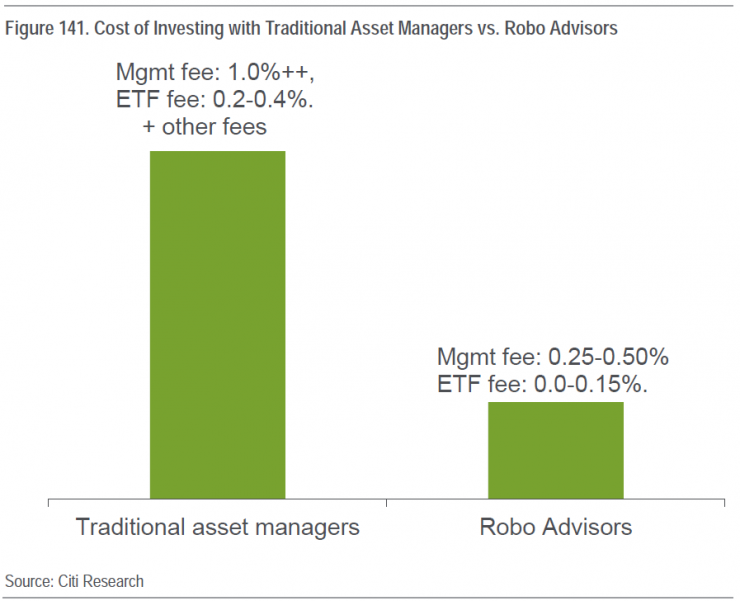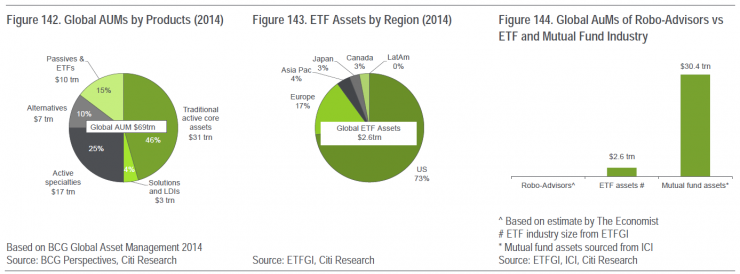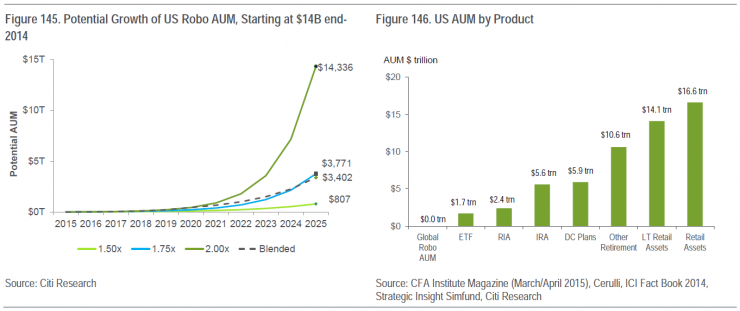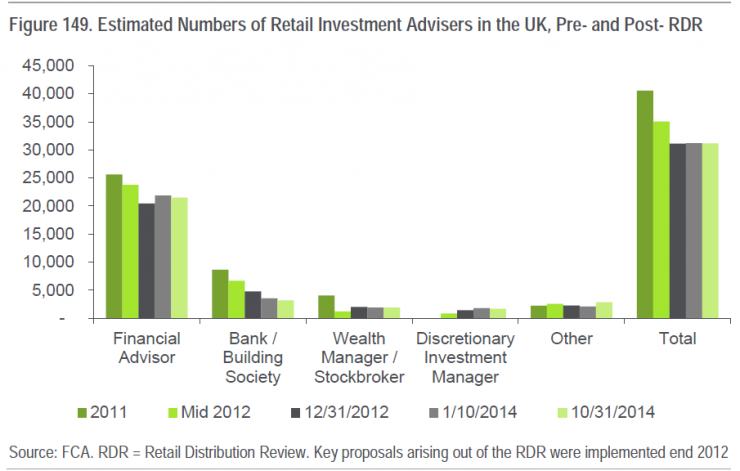Editor's Note: Smart Investment As an important area of ​​Fintech's financial technology innovation, people still have a lot of questions about it. With regard to its principles, business models, operations, and market roles, the Citibank report is systematically described.
Robo-advisors refer to robotic investment and investment advisors who use internet to provide customers with customized portfolios of investment securities.
The development of smart investment advice provides individual investors with more options for obtaining financial and investment advice. Previous investments have sought to obtain this advice only by paying a portion of principal as a management fee from traditional portfolio managers. And financial consultants. Importantly, human investment consultants do not necessarily have the energy to estimate a wide range of investors, but can only selectively serve high-net-worth individuals. Therefore, smart investing to solve the problem is the efficiency and universality.
Decryption smart searchHow does it work?
Investors completed an online questionnaire survey and completed the risk appetite test. This survey includes the investment amount, risk tolerance, and expected return. According to the preferences of investors, the intelligent investment promotion platform uses algorithms to select the portfolio of securities suitable for each investor from different types of assets (usually a low-cost transactional open-ended index fund ETF, and domestically, due to different financial systems. The subject is not ETF-based. In turn, the intelligent investment and care platform receives a certain amount of management fees and fund fees. These platforms also help users perform routine portfolio balancing, as well as providing additional services such as automated tax break harvesting based on settings.
Profit model
In the United States, smart investment platforms earn profits by charging 0.25-0.5% per annum of management fees, depending on the value of different investment platforms. For investors, they also need to pay 0-0.15% ETF fees. The smart investment in Europe tends to be more expensive than this.
Limited service
So far, the services provided by smart investment advisers have been limited to basic planning and investment (mainly investment in ETFs, and domestic targets include money funds, equity funds, bond funds, hybrid funds, bill financing, etc.). We think this will be less of a chance to attract personal investment.
Value proposition
Intelligent investment advice provides investors with a special proposition: lower account investment threshold, low rates, and most of them are based on ETF investment. In addition to reducing costs and ease of use due to automation, they also help to solve: effectively balancing diverse portfolios based on fundamental principles – for conservative investors with little market experience; combined with previously only high net worth investments The tax recovery strategy of the taxpayer; and the expansion and establishment of an investor base, including low net worth investors in the portfolio management market.

Comparison of investment costs between traditional investment consultants and intelligent investment consultants
Market sizeThe size of the global asset management industry is considerable, with more than $69 trillion in asset management size (AUM) spread across asset classes. Overall, active and passive management investments account for the bulk of the approximately $41 trillion, including stocks, fixed income, commodities, and foreign exchange. However, since smart investment and investment platforms are basically oriented toward investment management funds, we think that comparable targets include the mutual fund and ETF industries, both of which manage about 30.4 trillion U.S. dollars and 2.6 trillion U.S. dollars respectively. Geographically speaking, ETF asset management is mainly distributed in the United States, which is about 1.9 trillion U.S. dollars, accounting for 73% of the total intelligent educated ETF asset management.
In contrast, the current market size of smart investing accounts for only a small part of the entire asset management industry and is expected to be US$20 billion. The United States’ large-scale independent smart investment consultants include Schwab Intelligent Portfolios (about $4 billion in management), Betterment (up to $3 billion in November 2015, and Wealthfront ($2.6 billion in AUM). Currently, smart investment services With a huge potential market, their current major customers—the young U.S. millennials and the X-generation investors—will continue to rely on smart investment after they become richer in the foreseeable future. With the rapid registration of users, Schwab expects that the US smart investment market will reach 400 billion U.S. dollars in the next few years.

At the same time, the global smart investment market has a potential of approximately 13.5 trillion U.S. dollars. A report from McKinsey in June 2015 estimated that the potential value of global financial services based on virtual service management is approximately US$13.5 trillion, of which US$6.4 trillion in North America, US$3.4 trillion in Asia, and US$3.3 trillion in Europe. 0.4 trillion US dollars, Latin America 0.1 trillion US dollars. Note that this is the total assets of the virtual platform management, not just smart investment. It can be said that managing financial investment through Internet technology is an important trend.

We have seen that the emergence of smart investment advice is the use of automation technology to improve the production efficiency of traditional investment consultants, rather than giving people the major risk of being replaced. We have found that the number of US private financial advisers has doubled between 2000 and 2010, but it is expected that the growth rate of similar jobs from 2012 to 2022 will be only 27%. The growth rate of financial analyst jobs from 2000 to 2010 is 38%, but the growth forecast from 2012 to 2022 is reduced to 16%.
We believe that the demand for high net worth and more sophisticated investors will still be demand-side suggestions. However, the consulting services provided by investment consultants have great potential for improvement with the help of tools such as virtual technology and smart investment advice, which can increase the efficiency of private consultants, serve more customers, or can be more complex in terms of methods. science.
For investors in the mass market, or where the level of wealth does not allow them to seek more high-cost, personalized investment advice, intelligent investment in this type of technology provides an effective solution.
Analysis of Cases of UK and US Intelligent Investment MarketUS case study
The intelligent forecasting companies that have gained the market's first-mover advantage have quickly gathered a large number of management assets. Take Wealthfront and Betterment as an example, their AUMs have reached 2.5 billion U.S. dollars. But existing larger companies than their larger counterparts have also quickly taken action to deal with these threats. These existing companies either acquire their technology through the acquisition of such startups, or provide customers with lower-cost alternatives. Program. In the United States, traditional enterprises have begun to adjust themselves and meet the challenges of the times.
Recent cases include:
Blackstone, the US bond fund management company, acquired wealth management startup Future Adviser;
Vanguard launches smart advisor Personal Adviser Services;
Charles Schwab, Charles Schwab, announced the smart investment in Scwab Intelligent Portfolios.
In the face of the layout of traditional enterprises, smart investment companies began to create hybrid models for themselves. For example, financial engine company Financial Engines recently announced that it had acquired The Mutual Fund Store, and Betterment opened its digital investment technology to traditional investment consultants.
UK case study
In the UK, the wealth management consultancy market has undergone major changes since the implementation of the FCA (Financial Market Conduct Authority) and the Retail Distribution Review (RDR) submissions, including: more burdensome qualification requirements, and an economic model of major changes. The chart below shows how the number of UK consultants has changed during this period.

According to the survey, we have seen that after experiencing the RDR turmoil, technology and automation have brought about a recovery in the financial consulting industry and become more efficient. However, so far, the success of simple smart investment products has been limited, and we believe that regulatory actions will bring a lot of shock to the industry. FCA is examining whether financial advice can really promote the development of the wealth management industry, such as whether there are gaps in the investment behavior of financial advisory services and investments without consulting services. The relevant agencies also plan to propose a reform package:
Licensing the rational operation of intelligent investment advice;
Promote the establishment of a wide range of markets to provide financial advice to consumers;
Create a healthy regulatory environment that allows companies to understand their competition and innovation needs to fill the gap.